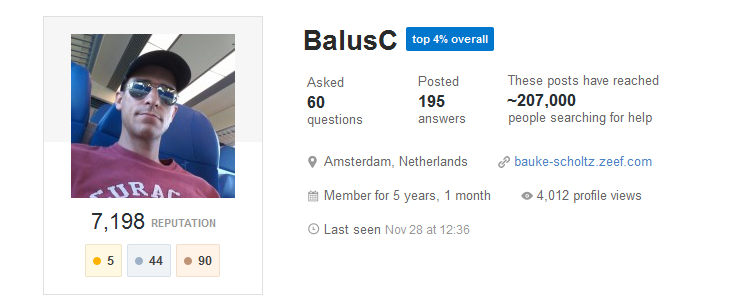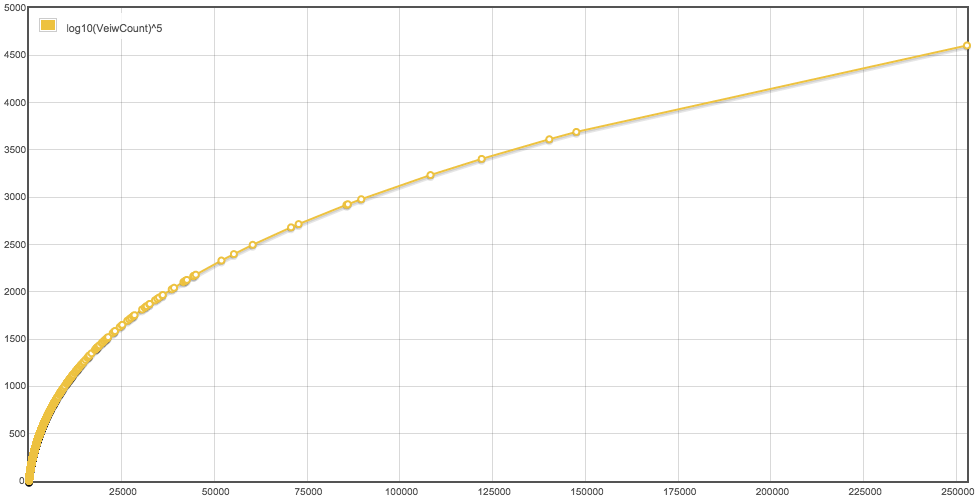We've got a new statistic on the shiny new Profile Page Prototype. It's not perfect yet. And we did a pretty crap job of explaining what it's all about! Let's talk.
What you do here isn't just about solving one person's problem.
A while back, a user contacted us about his friend's account. His friend had been the top user on one of our sites, and active on a couple of others, and had died tragically and unexpectedly. We pointed him toward our guidance for these situations, but we wanted to give the family some perspective on how much their loved one had given here. It struck us that, unlike someone who donates their time in more traditional way (like tutoring), his family probably had no idea what a positive impact the user was having by helping so many people looking for answers.
I was easily able to pull up that he'd answered over 400 questions in just two years, and that the majority of his answers were deemed to be the most useful one. I could try to explain that he'd earned almost twenty thousand rep in that time. And I could tell them that what that meant was that he'd gotten roughly two thousand "up-votes." The problem was that all those things failed to convey what felt important:
A huge number of people who needed help very likely got it, thanks to this user. Digging in further, I discovered that his answers were viewed more than 590,000 times, with the vast majority of those views from people googling for help. That's the impact he made with his time here.
And the same is true for a good many of you reading this: the answers you've written and the questions you've shared have gone on to benefit hundreds, if not thousands of people who found themselves facing similar problems. This is a fundamental part of why Stack Exchange exists - and yet, nothing in the system recognizes this or communicates the multiplicative impact that individuals like you make here.
You gotta get this to get us.
Why should we care if people understand just how important the idea of reusable content is here? For existing users, it can provide some rough perspective on how big an impact your time donated here really has. One thing that drew me in long before I worked here was the idea that my effort here would help more people than it ever could buried in some forum. Now, it's fine if you personally find it just as fulfilling to help one person as it is to help a thousand. Or perhaps your motivation is the challenge in solving an especially hard problem... That's awesome too.
But whether or not the number of people who benefit from a post speaks to you personally, it's valuable for everyone to understand that the engine is designed to make content as reusable as possible, because it informs so much of how our system works...
See, once you realize that it's not just about the one asker, or the four voters, but rather the fifteen thousand searchers with the same problem... Well, suddenly, a whole ton of things that seem prickly and self-important, like editing out "Thanks in advance!" aren't about being "a bunch of power-happy pedants," they're about helping all the people who will ever have that problem to find the best answers. And find 'em instant-like.
How it currently works (and why).
Our initial idea was to capture "Approximate Views of your Helpful Posts". The concept was to give you some sense of how many people saw your work, and had a decent chance of having found it useful. It was not intended to be a replacement for reputation, or to grant any additional privileges within the system (as rep does). It's also not being shown anywhere but the individual's profile (unlike, say, badges). It's also not about measuring effort - we're working on some other ways to better display all the indispensable things folks do to improve the site, and will share them for feedback asap. This was to show the reach your effort had.
The initial methodology idea was just to sum up the total views on all your posts. But we ran into two key issues on answers:
- We didn't really want it to include answers that no one in the community had deemed useful.
- Plus, we can't really even count the views on answers, nor can we count just the views on a question page that came in after a given answer was posted.
So, we realized we had to start by defining some key goals and constraints:
- Will be an estimate, but will generally be a solid approximation in most cases that minimizes meaningful anomalies
- Can be applied to existing posts with data we have (meaning we don't need the post-answer viewcount)
- Should limit answers counted to those that someone in the community found helpful
- Should minimize cases where an answer that adds little (and probably isn't seen by anyone) adds large numbers to the count
- When still in doubt, errs on the side of including views - we'd rather slightly over-appreciate volunteers then under-appreciate 'em
Ultimately we reduced our criteria to:
Views of pages where your helpful posts had some decent probability of being seen.
That doesn't mean we know the visitor scrolled to your post, or that your answer helped them - we simply don't track that. But we should be able to estimate the likelihood of a given question or answer been seen as useful by viewers without enabling the 25th answer on an insanely popular post to get a lucky up-vote and credit all the views to the new author.
That's how we got to the current method, which counts views on the following:
- Questions
- Non-deleted only
- Answers - Views of the parent question for answers that are:
- Non-deleted AND
- Score > 0 AND
- Not self-answers AND
- Also meeting one or more of the following criteria:
- In the top 3 answers OR
- Is the Accepted Answer OR
- Score at least 5 OR
- Has at least 20% of the total vote count
(Note on closed questions: we originally were excluding closed questions, too, but it seemed to cause more harm than good: the ones that never should have been here almost all get closed before attracting many views, so including them very rarely matters. But the ones that are closed with a ton of views almost all were permissible back in the day, so having the score plummet when the rules evolve seemed more harm than the alternative, since the impact is so small there.)
This query is a very close approximation of what's live in the prototype. (It has some minor tweaks to make it play nicely with the public data.)
How can we make it better?
We need your help. Let's use this new number to help convey the underlying concept behind most of what makes us seem so crazy to new users, and to remind the rest of us why we (hopefully) think our time is better donated here than on any of the many other places we could be sharing what we know online. But let's do it right. That's where you come in.
Whatever we change, we're going to add a tooltip that clearly conveys that the number is a rough estimate, and also explains how it's calculated (or links to that methodology).
A lot of you really liked the idea of this number, but it elicited two specific types of helpful feedback:
- The methodology definitely needs to be clearer, and might be improvable
- Calling it
"Bunnies and Puppies Saved by Hugs""People Helped" is, at a minimum, a little distracting, and at worst, makes us "Filthy, evil liars." Okay, no one quite said that. But almost.
So, we want your input.
Big Question #1: Do you have any suggested tweaks to improve the calculation method?
Again, what we're going for is something that will generally approximate: "Views of pages where your helpful posts had some decent probability of being seen."
Remember that:
- This isn't pure/perfect/science/a-number-that-actually-does-anything.
- It is an estimate.
- It's okay that it can't separate views that came before your answer, so long as it's very unusual that an answer posted way after the question on a popular question will count.
- It's okay if it can get weird occasionally, as long as those cases are fairly rare, or will tend to occur when the number won't change that much anyway.
We think the current calc does a solid job at this, and most of the feedback so far was more about the name not matching the method (vs. the method being off,) but I bet you can help us make this estimate at least a bit more accurate.
Big Question #2: What's a better name?
We're aiming at something that:
- Conveys the real-world, human difference you're making - "Page Views" doesn't do this well. "People helped" clearly evokes that concept, but the name...
- Shouldn't include too many iffy assumptions about how people feel - If it suggests we know a lot more than seems possible, it clearly distracts from the goal. ("4,052 Babies Rescued From Killer Bees - All Thanks to YOU!")
The goal is to find a name that helps convey that the number is a ballpark representation of the people who had decent odds of getting some real use out of the effort you put in here.
Let us know what you think on the questions, and we can get to work improving this thing.




AnswerViews = PostViews * (AnswerAge/PostAge).